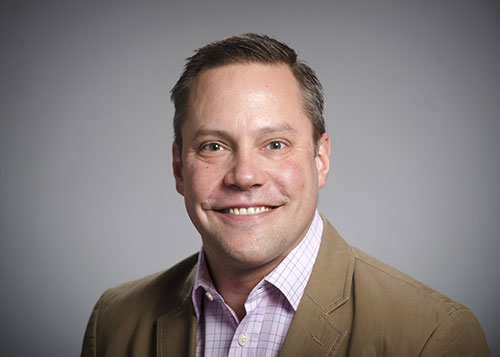 At the beginning of the year, Wesley Zech, Ph.D., joined the UAB faculty as the director of the Master of Engineering (MEng) degree with a concentration in Construction Engineering Management (CEM).
At the beginning of the year, Wesley Zech, Ph.D., joined the UAB faculty as the director of the Master of Engineering (MEng) degree with a concentration in Construction Engineering Management (CEM).
Zech comes to UAB after 15 years at Auburn University, where he was the Brasfield and Gorrie Professor of Construction Engineering and Management. In addition to teaching, Zech has conducted external research in collaboration with the Alabama and Ohio Departments of Transportation that led to the development of the Auburn University Erosion and Sediment Control Testing Facility—a full-scale testing facility geared toward the stormwater industry that covers approximately 2.5 acres of land.
Other areas of research include construction safety, work-zone safety, and the use of unmanned aerial systems for construction site inspections.
As the spring semester moves toward a close, Zech recently sat down to answer five questions about his role as director of the School of Engineering’s oldest online master’s track of study, as well as what he envisions as the future for CEM moving forward.
After 15 years at Auburn, what attracted you to this position at UAB?
First off, it’s a leadership position that is in my area of expertise and focus. In addition, education is changing, and this is a program that uses technology to deliver and advance graduate education, which has proven to be adaptable and highly successful. I’ve served as a faculty member for a while; however, the chance to work in an administrative role with a high-functioning group of people provides me with an opportunity to focus on leading a program in an innovative way and helping it continue to grow.
Were there any immediate changes or short-term goals that you tackled early?
No, when you take over a program that is already successful, it’s more about building on the existing momentum. The continued success of the program to date can be attributed to the hardworking team that has overseen the program during its transition, which included Dianne Gilmer, Allen Murphree, Fran Lefort, and various instructors who worked with Dr. Fouad while he served as the interim director. But that’s not to say I’m satisfied keeping things at the status quo. We are very excited to see how we can continue to use technology to push the envelope further. At this point, though, what we’re doing is functioning very well.
You’ve said you want the program to be adaptable to changing technological and economic conditions. With that in mind, are there long-term goals you can shoot for within an adaptable framework?
One of the things we have been discussing is to have CEM be its own degree program. Currently, it is one of several tracks of study within the Master of Engineering degree. We will be better suited to grow and adapt if we are an independent program that offers a master of construction engineering and management. That’s a big goal and there are some administrative challenges we’ll have to accomplish before that can happen. It will probably be a two- or three-year process, but I am optimistic that we can make that happen.
Online programs are able to cast a wide net in recruiting. Who do you see as the ideal CEM student?
I think it would typically be someone currently working in the construction industry who may or may not have received a formal education in civil engineering but has the desire to obtain a higher level of knowledge in construction. Some construction professionals may have earned a four-year degree in a different field, like business, marketing, or finance and didn’t get an exposure to civil engineering and construction principles, so their potential in this field is limited. There are a lot of smart, highly qualified people in construction positions who could benefit from this concentration. CEM allows them to obtain that requisite knowledge and begin applying it to their current job with the anticipation of career advancement. By having a concentration that is 100 percent online, we’ve removed a lot of barriers that may have kept those individuals from earning a graduate degree, which may have limited their potential advancement in the field.
That covers your professional plans. What do you do when you’re not working?
Raising kids. My wife, April, and I have a six-year-old son and four-year-old daughter. April played volleyball at Drexel and coached at University of Pennsylvania, Duke, Miami, Virginia Tech, Georgia, and Auburn. She stepped away from coaching to focus on our kids, however we both try to stay active, and volleyball is a sport we both enjoy in our spare time.